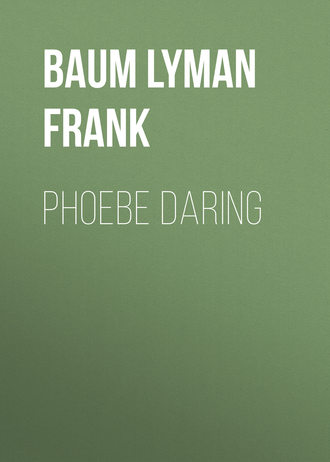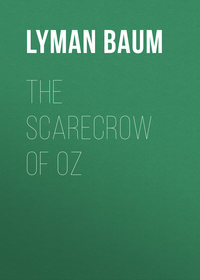 полная версия
полная версияPhoebe Daring
She carried them home and placed them in her desk, for as it was nearly suppertime she had no opportunity to examine them at present. That evening she related to Cousin Judith the latest evidence found against Toby Clark; “manufactured evidence” the girl called it, for she knew Toby had never touched the contents of Mrs. Ritchie’s box. She also told the Little Mother of Mr. Spaythe’s confession, laying stress on his assertion that at least three different persons, including himself, had stolen the box.
“But Mr. Spaythe did not really steal it, you know,” she added. “When he found it open on the office table, and the cupboard locked, he merely took the box away for safe keeping.”
“He took Mrs. Ritchie’s document, however, and is still holding it, without her knowledge or consent,” returned Judith thoughtfully. “I wonder why?”
“I am sure he had a good reason for that,” declared Phoebe. “The fact that Mrs. Ritchie is making such a fuss over that one paper, and that Mr. Spaythe is carefully guarding it, makes me think it is more important than the money.”
“That is probably true,” said Judith; “yet I fear there is nothing in that fact to save Toby. For, if Mr. Spaythe admits all the truth – so far as he knows it – at the trial, it will not clear Toby of the accusation that he first rifled the box of its contents.”
“No,” answered Phoebe, “and for that reason I must continue my search for the criminal. I had hoped that we had information to upset the entire evidence, until that dreadful development of to-day. It is the strongest proof against Toby they have yet secured, and I see no hope for the boy unless we can discover the guilty one.”
“Perhaps Mrs. Ritchie will refuse to prosecute Toby, now that she has recovered all her property but one paper,” suggested Judith.
“That would be worse for Toby than to stand his trial,” answered Phoebe, with conviction. “If he hopes again to hold up his head in the world he must prove his innocence – not be allowed to go free with the suspicion of his guilt constantly hanging over him.”
“Goodness me! what a staunch champion you are, Phoebe,” said Judith, smiling. “You must have thought very deeply on this subject to have mastered it so well.”
“It is a very interesting subject,” answered the girl, blushing at the Little Mother’s praise. “I seem to love a mystery, Cousin, for it spurs me to seek the solution. But I fear I’ve been neglecting my household duties of late and throwing the burden on your shoulders, Little Mother.”
“No, dear; I cannot see that you are at all lax in your duties; but, if you were, I would consider it excusable under the circumstances. I hope that in some manner you may light upon the truth and manage to solve your complicated problem.”
But when Phoebe went to her room to think over the discoveries of that eventful day, she was in a quandary how to act. The mystery seemed to have deepened, rather than cleared, and nothing had transpired to give her a clew of any sort.
Except the anonymous letters.
CHAPTER XX
HOW PHOEBE DEFENDED THE HELPLESS
For some time Phoebe had intended to make a study of the anonymous letters which Mr. Spaythe had lent her, so one morning when she was not likely to be disturbed she went to her room, took the letters from her desk and sat down to examine them carefully.
The handwriting was purposely made to sprawl this way and that, slanting first to the right and then to the left. The grammar was good enough and the spelling correct except for one word. In the second letter received by Mr. Spaythe the word “mattress” was spelled “mattrass”; but that did not seem to her of any importance, for it was a likely error. There was nothing to indicate that a woman rather than a man had written the letters, but Phoebe had reasons for guessing it was the former. In the first place, she now knew that a woman had stolen the box. Mr. Holbrook had seen her take it from the office to her home. She must have replaced it, the next day, empty save for one paper inadvertently overlooked – the most precious paper of all to Mrs. Ritchie. In her agitation she had forgotten to lock the office door behind her, so that Mr. Spaythe was able to enter. The woman, Phoebe argued, must have observed Mr. Spaythe taking away the box and, fearing discovery through it, had stealthily followed him and as soon as he had left his office crept in and taken it again. Then Sam Parsons had discovered the box in her possession and made her give it up, after exacting a confession and promising to shield her. Or else Sam had himself taken the box from Mr. Spaythe’s office, thinking he would thus protect the banker from suspicion. That part of the story was at present too involved for her to determine the exact truth.
But returning to her argument that a woman, or at least a girl, had written these letters, and also written duplicates of them for Mr. Kellogg, Phoebe felt that so rash a proceeding might only be attributed to one of her own sex. A man would have realized the danger they might evoke and so have refrained from sending them.
What was the danger? she asked herself. The irregular penmanship was so cleverly executed that there was nothing to guide one to a discovery of the writer. She laid the two sheets of notepaper side by side. They were of the same cheap quality that one may buy at any store. No watermark. Nothing distinctive about the envelopes.
She went over the words letter by letter. Although written at different periods the writing was equally well disguised. But the same person wrote them, for the capital “T” that appeared in both, in the name “Toby Clark,” had a peculiar curl at the beginning of it. This “T” slanted one way in the first letter and the opposite way in the second, but the little curl was in both.
Suddenly the girl realized that here was a clew to the writer. That peculiarity in forming the letter “T” must be characteristic and the same curl would doubtless be found in the normal writing.
With the idea that it might be some girl whom she intimately knew Phoebe went through her desk and examined the capital T’s in every scrap of correspondence it contained, but without finding any indication of the telltale curl. It was late when she finished this task and so she went to bed feeling that she had accomplished nothing of value.
After this the days passed rapidly without any further developments. Public opinion in Riverdale was again undergoing a change and although the Marching Club paraded several times and once took the band to Bayport – with money left from the mysterious donation – people viewed the demonstrations with good-humored tolerance but were not impressed as they had been at first. There was a general feeling that Toby Clark’s case was hopeless and Phoebe was greatly annoyed by reports that Tom Rathbun and Dave Hunter, with some others, had openly denounced Toby as a thief, saying it was all nonsense to claim he was innocent when he had been “caught with the goods.”
Young Hunter, Lucy’s brother and Phoebe’s instructor in telegraphy, was the most bitter of these assailants and seemed to take pleasure in sneering at Toby on every possible occasion. This surprised Phoebe the more because she had always considered Dave a kindly, manly young fellow, usually generous in his criticism of others. Something had doubtless turned him against Toby Clark and aroused his enmity, for Dave had condemned the boy out of hand almost from the moment of his arrest.
One dismal, cloudy afternoon, when Phoebe had been down town and was hastening home to supper, she turned up a side street and saw before her a crowd of children who were jeering and hooting at the top of their voices. These were not the children of good families, such as were members of the Marching Club, but the ragged, neglected gamins that are to be found on the streets of every Southern village; both white and black; mischievous, irresponsible youngsters who delight in annoying anyone and anything they dare attack, from a stray dog to a country woman driving to market.
Phoebe well knew the tribe and, as she heard shouts of “Robber!” “Thief!” “Jailbird!” ring out, at once suspected the truth. With rising anger she ran toward the group and reaching the outskirts of the little crowd she hurled the mockers right and left, whereby she came face to face with Toby Clark. The boy, leaning on his crutch, was cowering with bowed head before the jeers of his assailants.
“Shame on you all!” she cried, glaring around with righteous indignation. “How dare you attack one who is more unfortunate than yourselves – a poor, weak cripple, who needs friends more than you need soap-and-water?”
They shrank away, sullen and resenting her interference, and those who refused to run she threatened with her umbrella until they were driven off and she was left alone with their victim.
“Come, Toby,” she then said, with assumed cheerfulness; “let’s go home. You mustn’t mind those dreadful creatures; they’re ignorant of common decency.”
“I – I’d no business to come out,” he replied in a sad voice. “But I’d been in the house so long, and I wanted the air, and – ”
“You’ve as much right on the streets as any other decent citizen,” Phoebe said warmly.
“Not at present,” returned Toby. “Those children think I am a thief, and so do many other people, and because I cannot prove that I am honest they consider it right to revile me.” He was hobbling along at her side as he spoke. “Isn’t it queer, Phoebe, that a mere suspicion can blot out one’s reputation, won by years of right living, and force one to defend himself and prove he is not a rascal?”
“It’s all wrong, Toby, and the law is greatly to blame for it, I think. It’s an absurd idea that anyone can swear out a warrant for another person’s arrest, charging him with any dreadful crime, just because that person has a suspicion he is guilty, and makes complaint against him. Any good, honest citizen may be thus disgraced and forced to prove his innocence before he is free again; and even then the smirch clings to him for a long time. It’s an unjust law and ought to be changed. No one should ever be arrested without proof of his crime. The one who makes the complaint should furnish such proof, and not oblige the innocent person to defend himself.”
Toby looked up at her with an admiring smile.
“I’ve studied law some, you know,” he said, “and what you propose is a revolution. It is more just than the present law, which ruins many lives and furnishes no redress, but I fear it would permit many guilty ones to escape.”
“You won’t pay any attention to what those children said?” she pleaded.
“Not more than I can help. They’ve heard others say I am a thief, so we mustn’t blame them too severely. They don’t know any better – poor little things.”
She left him at Mr. Spaythe’s house and proceeded toward home in a very depressed mood. It was dreadful to know that Toby was subjected to such insults whenever he showed himself on the streets, and yet this was nothing to the humiliation and disgrace he must endure if they fastened the theft upon him and condemned him to a prison sentence.
CHAPTER XXI
HOW PHOEBE TELEGRAPHED THE GOVERNOR
The day set for the trial was drawing so near that presently Phoebe became greatly worried. Winter had suddenly set in and the weather was so cold and disagreeable that she could not get out as frequently as before. She saw Mr. Holbrook once or twice but found him despondent.
“They’ve got us practically between two millstones,” he said, “and since we are unable to use our knowledge of the truth for defense, we shall be obliged to take our chances of defeat. I’m sorry, but it can’t be helped.”
Phoebe, however, thought it could. She asked herself how far she was bound to respect the various confidences reposed in her, when they meant the ruin of an innocent young life. She knew enough, she believed, to save Toby if she were allowed to go upon the stand and tell it all; but she felt that she was so inexperienced in legal matters that if she acted on mere impulse she might make a failure.
Meantime she kept studying the anonymous letters and one day decided to find out where the notepaper had been bought, if possible, as that might put her in the way of determining who had bought it. So she went to town and made her way to the post office.
Hazel Chandler waited upon her at the little stationery shop in the office, and Phoebe thought the young girl looked pale and worn. “They’re working her too hard again,” she reflected, and yet Hazel’s duties were no more onerous than those which many shop-girls voluntarily undertook. She also had the advantage of working for her father and running the little store as she pleased, although she was obliged to leave her counter for the post office whenever Will Chandler was out, as was often the case. Besides being one of the village council the postmaster was interested in several other things which required his attention outside, so that Hazel as assistant postmaster waited on most of those who came to the office for their mail.
There was no one but Phoebe in the place just now and she asked to look at some notepaper.
“No, not the box sort, Hazel; just the common kind,” she added.
The girl laid several qualities before her and soon Phoebe recognized the kind she was looking for. She bought a few sheets and Hazel began to wrap them up.
“Have you heard much about – about Toby Clark’s case – lately?” the girl asked in a hesitating way.
“No,” replied Phoebe.
“It’s pretty black against him, isn’t it?” continued Hazel anxiously.
“It looks black, just now,” admitted Phoebe.
“I – I’m sorry for Toby,” said Hazel, with a sigh. “We – we’re all – very fond of him.”
Phoebe bristled with indignation.
“Your sweetheart, Dave Hunter, doesn’t seem very fond of him,” she retorted. “He takes every opportunity to denounce Toby and blacken his character.”
Hazel shrank back as if frightened by such vehemence. She bowed her head over the parcel she was tying, but Phoebe could see that her pale skin had flushed red.
“I – I’m not responsible for – for what Dave says, Phoebe,” she murmured pleadingly; and then to the other girl’s astonishment she put both hands before her face and began to cry, sobbing in a miserable way that was pitiful to listen to.
At once Phoebe became penitent.
“Forgive me, Hazel,” she said. “I know you are not responsible for Dave,” and then she took her parcel and went away, to give the girl a chance to recover her composure.
“The poor thing is almost a nervous wreck,” she mused, “and Dave’s bitterness toward Toby must have annoyed her more than I suspected. She probably loves Dave devotedly and hates to have him behave so ungenerously. I must ask Lucy when they are to be married. That would relieve her of the confining work in the post office and enable her to recover her health and strength.”
At the drug store opposite she found more of that identical notepaper, and the stationery counter at Markham’s dry goods store had it also. It was a grade so common that everyone kept it and therefore Phoebe was forced to acknowledge that her quest had been a failure.
She was in the dumps next day, wondering if she had done all she could for Toby, when suddenly she remembered the governor’s parting injunction. “If you need me, send me a telegram,” he had said, and this brainy, big-hearted man was just the one she needed in her present emergency. At once she decided to telegraph Cousin John, for she believed that his advice, coupled with her knowledge – which she would frankly confide to him – might yet save the day for Toby Clark.
She would not say anything to Cousin Judith, at present, for if the busy governor found himself obliged to ignore her summons she wanted no one to be disappointed but herself.
Very carefully she worded the telegram, in order to present the case as strongly as possible without committing the secrets she guarded in advance of his coming. She wrote and rewrote it several times, until finally she was satisfied with the following:
“Please come and help me save Toby Clark. I believe I know the truth, but without your assistance Toby will be condemned on false evidence. A woman stole Mrs. Ritchie’s box and there is a conspiracy to shield her from discovery and wickedly sacrifice Toby in her stead. Will tell you all when you arrive. Come quickly, if you can, for time is precious.”
She signed this “Phoebe Daring” and putting on her wraps, carried it down to the station. Dave Hunter was in the little telegraph office, on duty but not busy. He laid down a newspaper as Phoebe entered his room and nodded rather ungraciously.
“Here’s a telegram, Dave, which I want you to send at once.”
“Day message, or night?” he inquired, taking it from her hand and beginning to count the words.
“Oh, day, of course,” she replied.
Suddenly he paused, with his pencil poised above the telegram, and a wave of red swept over his face and then receded, leaving it a chalky white. He did not lift his eyes, for a time, but seemed to study the telegram, reading it twice very slowly from beginning to end. Then he pushed the paper toward Phoebe and said in a hard, arrogant voice:
“I can’t send that.”
“Why not?” she asked in astonishment.
“I – it’s libelous,” he returned, rising from his chair before the table on which the telegraph instrument stood and facing the girl defiantly.
“It is not libelous!” she indignantly exclaimed.
“Well, I can’t send it; it’s against the rules of the office.”
Phoebe looked into his face searchingly and he half turned away. She remembered now Dave’s rabid enmity toward Toby Clark and concluded that he refused the telegram because he feared it would assist Toby’s case. But she would not be balked by such a ridiculous pretext and as her anger increased she grew more quiet and determined.
“You’re talking nonsense,” she said. “This is a public telegraph office and you, as the operator, are obliged to accept and send any message that is presented and paid for. It isn’t your place to decide whether it is libelous or not, and I demand that you send this telegram at once.”
“I won’t,” he said firmly. “I’m going out, Miss Daring, and must lock up the office; so I’ll trouble you to go.”
She regarded the young fellow questioningly as he took his hat and stepped to the door, waiting for her with his hand on the knob. Then she slipped into his seat at the table and placed her hand on the instrument.
“Here!” he called fiercely. “What are you doing, girl?”
“If you won’t telegraph the governor, I will!” she declared. “Stand back, Dave Hunter, and don’t you dare to touch me or interfere. I’ll save Toby Clark if I have to put you behind the bars in his place, and perhaps there’s where you belong.”
As she spoke she was clicking the little instrument, calling the state capitol. Dave himself had taught her how to do this. The operator now stood motionless beside her, looking down at the courageous girl with unmistakable terror in his eyes. Perhaps her threat awed him; perhaps he had other reasons for not venturing to prevent her extraordinary action.
The answer came in a moment. Fortunately the wire had been free and as soon as she got her connection she began clicking out the message – as dexterously as the regular operator himself might have done.
Dave listened, as motionless as if turned to stone. She demanded a “repeat” and from the other end came the repetition of the message, exactly as the girl had sent it. She answered: “O K,” rose from her chair and calmly asked:
“What are the charges?”
The young man drew his hand across his eyes with a despairing gesture and limply sank into the chair.
“Go away, please,” he replied.
Phoebe picked up the rate book and figured the cost of the telegram. As she did so her eyes fell on a railway order which Dave Hunter had written on a blank form and after staring at it a moment she stealthily folded it and slipped it into her pocket. Then she laid the exact change on the table and walked out of the office. As she closed the door softly behind her she noticed that the operator had dropped his head on his outstretched arms and seemed to have forgotten her existence.
A sudden horror and aversion for the young man welled up within her, but she felt elated and triumphant, as well. She had sent the message in spite of all opposition and – she had made a discovery!
The writer of the anonymous letters was none other than Dave Hunter.
Phoebe could scarcely wait to get home before examining the order she had taken from the telegraph office. Once within her own room she eagerly spread it out before her and studied it with care. It was a simple railway order addressed to the supply agent at St. Louis, and said: “Twenty beds with mattrasses and pillows for laborers at Section 9 without delay.” It was signed by the Division Superintendent but was in Dave’s handwriting and had doubtless been dictated to him to be wired to the agent.
But within it lay the proof Phoebe had so long and vainly sought. Not only was the word “mattress” misspelled as in the anonymous letter, but the capital “T” in “Twenty” had the same preliminary curl to it that she had observed in both letters, wherever “Toby” had appeared.
This discovery positively amazed the girl. She had never suspected Dave, whom she now believed had hidden both the papers and the money in Toby’s house, on different occasions, with the evident determination to incriminate the boy. Then, by means of the anonymous letters, Dave had told where the stolen property could be found.
But Dave had not stolen the box. A woman did that. She sighed as she thought of Lucy, an ambitious girl, and of Mrs. Hunter, who was prominent in all the social affairs of Riverdale and an earnest church member. It was easy enough to understand now why Dave had denounced Toby.
Cousin Judith knocked at her door.
“A telegram for you, Phoebe.”
She tore it open, while Judith watched her face curiously. It flushed with joy.
“The governor will be here in the morning,” she said. “You don’t mind, do you, Cousin Judith?”
CHAPTER XXII
HOW SAM PARSONS EXPLAINED
“You caught me just right, my dear,” said the governor, smiling cheerily into the girl’s anxious face. “I had nothing of importance on hand at this time, so I ran away from half a hundred unimportant demands and – here I am.”
He came for breakfast and was as eager for Aunt Hyacinth’s peerless flapjacks as any of the youngsters, laughing and chatting with the entire family like a boy just out of school. But afterward he sat with Phoebe and Judith in the cosy sitting room and listened gravely to every detail of the young girl’s story.
Phoebe was very frank in her relation, concealing nothing that she had discovered or that had been confided to her. “I am supposed to keep some of these things secret,” she said; “but I believe this secrecy on the part of Toby’s friends, and their failure to get together, is going to send the boy to prison unless we take advantage of our knowledge and accomplish something practical. Anyhow, I can see no harm in confiding in you, Cousin John, even if no good comes of it.”
The governor nodded approval.
“That’s right, Phoebe,” he said encouragingly. “Dust all the shelves and let the grime settle where it will.”
Before this man had been drawn into politics and became first a senator and then twice governor of his state, he had been a lawyer of unusual prominence. His keen intellect followed the girl’s recital with comprehension and even “read between the lines.” During the story he saw probabilities she had never guessed. But he said:
“You have shown admirable intelligence, Phoebe, and I see you have quickly recognized the important points of your discoveries. With the information you have given me I believe I can put my finger on the identical woman who is responsible for Toby Clark’s tribulations.”
“Oh; can you, sir?” she exclaimed. “Then I must have been very stupid.”
He turned to Judith with his whimsical smile.
“You see, she won’t admit that a rival detective has any talent.”
“Yes, I will,” said Phoebe. “I didn’t mean it that way at all. But I can see no ‘identical’ woman in the case, as yet. A mysterious woman stole the box, and of course it is a member of Dave Hunter’s family – his mother or sister – or perhaps his sweetheart, Hazel Chandler. Which of the three do you mean, sir?”









